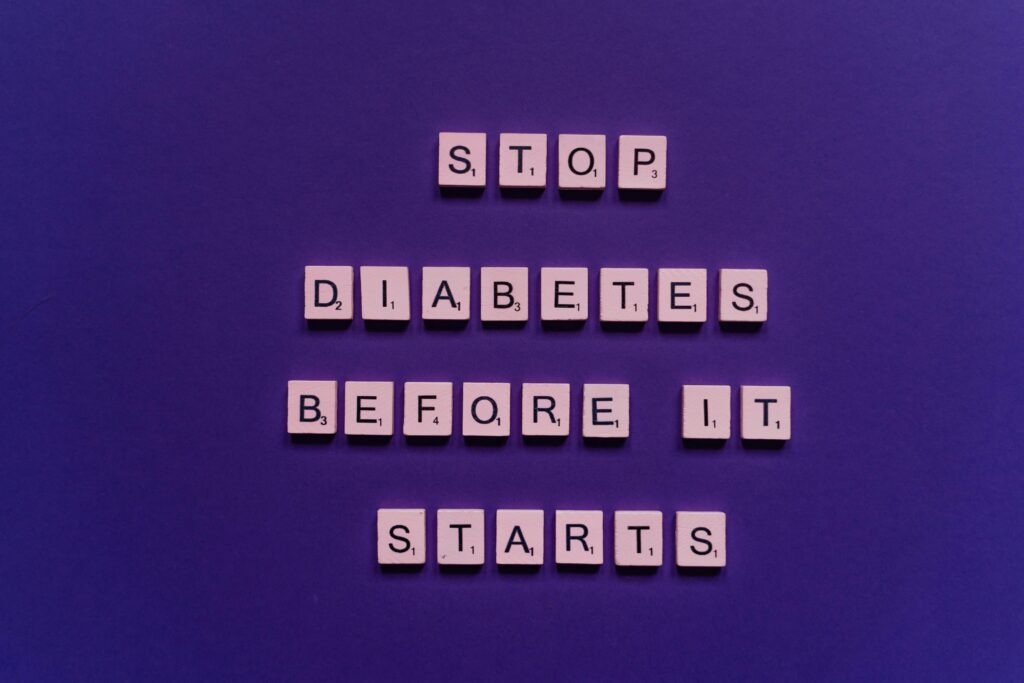With so much conflicting information available, you may have questions with where to even begin. In our Foundations series, we start with the basics and cover topics that are important to your health and wellness. We give you easy to digest information that answers your questions and hopefully leaves you wanting to know more! Today we explore Diabetes. There is so much more than sugar intake at play here!

What is diabetes?
There are many different types of diabetes (12 by some counts)1 but today we are going to discuss Type 2 diabetes (T2D), which accounts for about 90% of all cases.
So what exactly is type 2 diabetes? In short, TD2 is a condition where your body fails to produce enough, or respond appropriately to insulin. The hormone insulin is produced by your pancreas and moves sugar (glucose) from the food we eat into the cells where it can be used. This is a great thing! But when the sugar in our food outpaces the amount of insulin our pancreas can make, our blood glucose rises. With prolonged high blood sugar (hyperglycemia), our cells become immune, or resistant to, the effects of insulin making it harder and harder for the body to get what it needs. 2,3
As we follow the blood circulation from our heart, where it gets pumped out to the body, it travels through progressively smaller and smaller blood vessels until reaching the capillaries. This is where oxygen and nutrients are delivered to the cells. In exchange, waste products are carried out of the body.
In T2D, the blood isn’t able to work as well in this exchange process. One reason is that the thickness of the blood prevents it from easily reaching those capillaries (picture honey or syrup), meaning that less oxygen and nutrients are delivered to the cells. The high sugar also causes structural damage to the walls of the blood vessels meaning that clots are more likely to form and the walls of the vessels may harden. The body produces reactive oxygen species in response to hyperglycemia and inflammation occurs. Ultimately, damage occurs throughout the body, leading to the health complications associated with diabetes4.
Diabetes Complications
When the blood is unable to circulate properly, the cells and tissue it is meant to serve becomes damaged. Certain parts of the body are more susceptible to this damage including the kidneys, eyes, feet, heart and nerves. Though the body is very resilient and compensates for this damage for a long period of time, eventually chronic conditions appear4,5.

- Coronary artery disease/heart attack – the blood vessels supplying oxygen and nutrients to the heart muscle become damaged and blocked. Too much blockage can lead to a heart attack where the heart muscle itself is damaged.
Stroke – Similar to blood vessel damage in the heart, the vessels supplying blood to the brain can become blocked leading to damage
Neuropathy – nerve damage leads to a loss of sensation or painful tingling in extremities. Nerve damage is also responsible for delayed gastric emptying leading the many GI effects of diabetes.
Kidney disease – the filtering mechanism of the kidneys is damaged leading to an inability to rid the body of toxins and waste.
Retinopathy – the small blood vessels of the eye are particularly sensitive to the damaging effects of high blood glucose.
Amputation – poor blood flow to the feet, coupled with a loss of sensation from neuropathy and a high likelihood for injury can lead to irreparable tissue damage and eventually amputation.
Testing for Diabetes
In recent years, the availability to test for diabetes has gone beyond the walls of the doctor office. This makes knowing your blood sugar numbers easier than ever and often much cheaper. Getting your values checked is now as easy as visiting your local pharmacy or self ordering labs through agencies like Quest or LabCorp.
Two blood tests are used to assess your blood sugar levels. A fasting blood glucose is a snapshot in time, measured after about 8 hours of fasting. This should optimally come back at <90mg/dl. An A1C provides a 3 month average of the blood sugar. This number is given as a percentage and should optimally be <5.5. When these numbers are elevated, even if they are in the “prediabetes” range, it is time for action.
In addition, a comprehensive diabetes assessment will also include a check of your kidney and liver function through a comprehensive metabolic panel as well as cholesterol screening.
Lifestyle Approaches to Treatment

DM2 is considered a lifestyle disease, as such making changes to daily habits can significant affect your health. Functional medicine prioritizes the effects of a healthy lifestyle on slowing or reversing disease. Medications are necessary in some cases, but all can benefit from the inflammation reducing effects of lifestyle modification6,7.
- Sleep – Sleeping less than 6 hours a night is associated with a significantly higher risk of developing diabetes. Sleep improves the body’s immune system, eliminates toxins and debris from the body and regulates cortisol levels important in insulin function. Additionally, ghrelin, the hunger promoting hormone is increased with sleep deprivation leading to cravings and excess calorie intake.
- Minimizing blue light from screens, sticking to a calming bedtime routine, and gentle movement help you get to and stay asleep more easily.
- Stress: The fight or flight response is a life saving mechanism that causes a surge of chemicals to be released via the sympathetic nervous system (SNS). Cortisol, adrenaline and other “go get-em” chemicals help you flee a predator or navigate dangerous situations. After the stressful event has passed, the “rest and digest” hormones kick in through activation of the parasympathetic nervous system. When stress doesn’t go away, the fight or flight button remains on. Over activation of the SNS leads to increased levels of inflammation and elevated cortisol, both of which are directly related to insulin Resistance and diabetes
- Breathing exercises, movement, participating in enjoyable activities and learning to say “no” are some ways to help break the stress cycle.
- Diet – The Mediterranean Diet is one of the most highly effective way at minimizing risk of chronic diseases including diabetes. This diet is rich in foods that are high in healthy fats and fiber, generally lacking from the standard American diet.
- Try switching one soda a day to fizzy water, substitute one packaged snack with fruit or vegetable and dip, try brown rice instead of white. The little things add up. And they begin to become habit.
- Exercise – A sedentary lifestyle is defined as spending more than 6 hours a day sitting or lying (outside of sleep). If you work in front of a computer (raises hand), guess what? The good news is that the health effects of sedentarism can be countered by exercising an average of 30 minutes a day, 5 days a week.
- NASA has even developed a handy dandy booklet with exercises you can do right at your desk.
- Sleep – Sleeping less than 6 hours a night is associated with a significantly higher risk of developing diabetes. Sleep improves the body’s immune system, eliminates toxins and debris from the body and regulates cortisol levels important in insulin function. Additionally, ghrelin, the hunger promoting hormone is increased with sleep deprivation leading to cravings and excess calorie intake.
- Supplements – The benefits and safety for supplements differ for everyone. I strongly recommend you reach out to a pharmacist or medical health professional to make sure there are not any interactions with other medications or disease states you have. That said, the supplements recommended here are generally safe when taken as directed. This list is not extensive. A full range of pharmaceutical grade supplements is available through Canopy Wellness’ Fullscript account.
- Magnesium8 – this is a powerhouse that is responsible for over 200 enzymatic reactions in the body. It plays a role in regulating blood sugar, but is also amazing for helping fall asleep
- Cinnamon9 – Cinnamon is available both as a spice as well as an over the counter supplement. Studies regarding cinnamon’s benefits have been done using higher doses (up to 6 g a day) which is more easily found in supplement form
- Gymnema – this is an interesting herb. It’s effects on blood glucose are best seen in the ability to decrease sugar cravings. Gymnema can be found in supplement form or as a tea.
- Probiotics – Gut health is increasingly linked to everything from mental health to autoimmune disorders. Our gut is our first line of defense and the standard American diet has led to a gut microbiome that is lacking in diversity. Probiotic supplements can help this as well as eating foods that have been fermented such as kombucha, kefir, kimchi and yogurts.
- Continuous Glucose Monitoring (CGM) – These wearable sensors track your blood glucose on a continuous basis. Initially designed and prescribed for diabetics only, they are now available over the counter for non-diabetics to get more insight on how certain foods affect their body. This is personalized medicine, as everyone is different. Many insurances will cover the cost of CGM, however if that is not available to you, over the counter options are now available through Stelo and Lingo.
Making any types of changes to lifestyle can be hard. The urge to do everything at once can feel overwhelming and may not be sustainable. Start at your own pace and make changes that resonate with you. Enlist friends or family for support and tips. Remember, our habits weren’t created in a day and they don’t change that quickly either. It takes conscious effort to create a new habit. But you can do it.
To learn more about Functional Medicine and see how it may help you, schedule a free 15 minute consultation or head to our Work With Me page! Don’t forget to sign up for our newsletter below as we delve into topics like lifestyle medicine, ingredient highlights, medication concerns and more.
Anytime that you are experiencing a health concern, please contact a healthcare professional for guidance. In the meantime, ensuring that you are providing your body with the nutrients it needs and supporting it through sleep and stress reduction will always provide benefit. The content on this site is for informational or educational purposes only and does not substitute professional medical advice or consultations with healthcare professionals.
References
- https://idf.org/about-diabetes/rare-forms-of-diabetes/
- https://diabetes.org/about-diabetes/type-2
- https://my.clevelandclinic.org/health/diseases/21501-type-2-diabetes
- https://www.sciencedirect.com/science/article/pii/S016752731836875X
- https://pmc.ncbi.nlm.nih.gov/articles/PMC4911847/#:~:text=Diabetes%20induces%20changes%20in%20the,type%202%20diabetes%20mellitus%20outcomes.
- https://www.levels.com/blog/what-is-glucose
- https://pmc.ncbi.nlm.nih.gov/articles/PMC5748760/
- https://ods.od.nih.gov/factsheets/Magnesium-HealthProfessional/
- https://pmc.ncbi.nlm.nih.gov/articles/PMC6425402/

Good